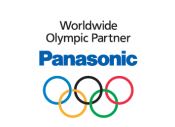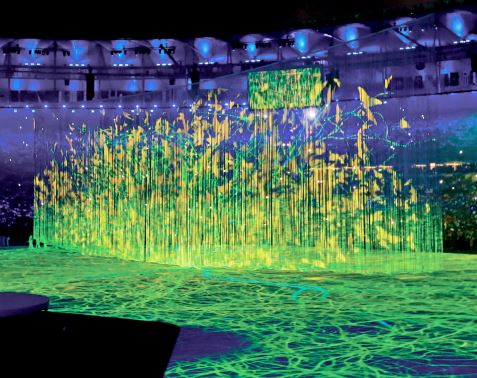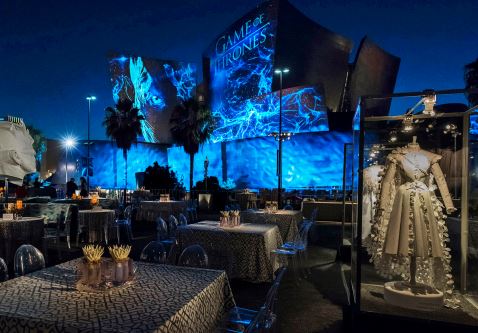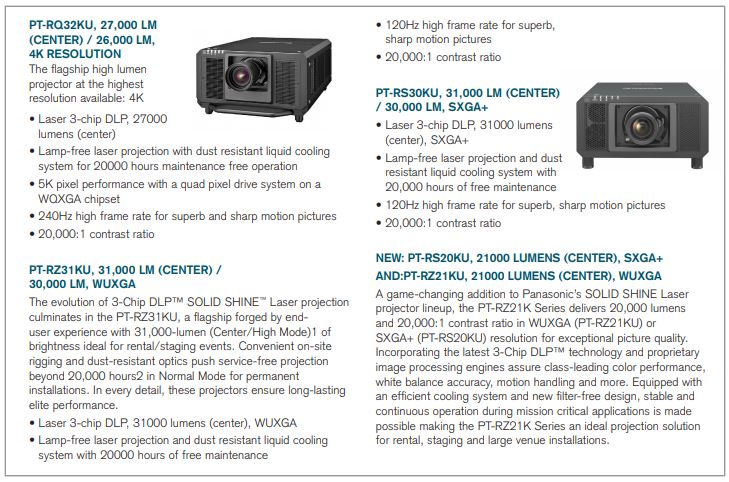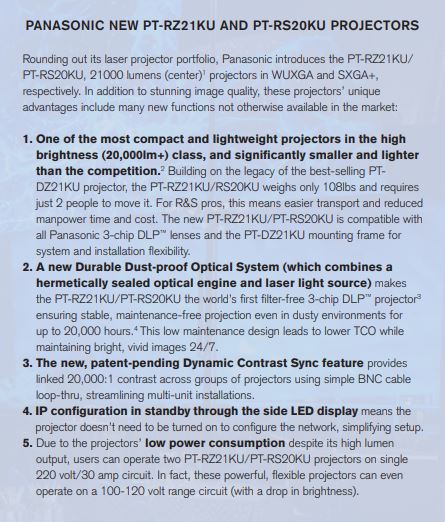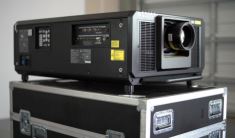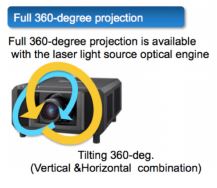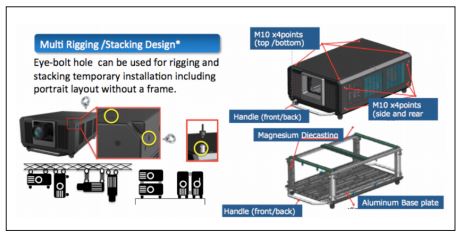September 4, 2018
11 min read
As the solid-state revolution in video projection powers on, sophisticated stagers know that all laser projectors are not created equal, and they’re demanding features that deliver not just better total cost of ownership (TCO) but also better imaging, rigging, and video processing performance. Learn what top rental and staging professionals look for in a projector […]
Read WhitepaperAs the solid-state revolution in video projection powers on, sophisticated stagers know that all laser projectors are not created equal, and they're demanding features that deliver not just better total cost of ownership (TCO) but also better imaging, rigging, and video processing performance.
Learn what top rental and staging professionals look for in a projector and why the most demanding stagers agree: not all laser projectors are created equal.
INTRODUCTION
The best video projectors for live-event staging combine unique light engine and image-processing advances with advanced setup, rigging, and other features that make the staging professional’s job easier and more profitable. But when choosing the right projector for staging and live-event applications, professionals need to carefully compare feature sets and performance criteria. The rental and staging professional should seek out key advanced features—features that are being implemented by the most successful professionals in the field today. This white paper examines those image-quality, motion-processing, rigging, cooling, maintenance, and TCO best practices and features that separate the leaders from the followers among the projector manufacturers serving the live-event staging community.
Stereoscopic floor and screen projection defined the Olympic Games Rio 2016 Opening Ceremony.
At the Olympic Games Rio 2016 Opening Ceremony, aspects of Brazilian culture and heritage were enhanced with spectacular largescale mapped visuals carefully programmed and projected from four directions using the PTRZ31K SOLID SHINE Laser projector and about 110 Panasonic PT-DZ21K2 projectors. Marco Balich, Olympic Ceremonies Executive Producer remarked: “We are very pleased that Panasonic partnered with us in delivering what I consider the best projection ever in an Olympic ceremony.”
THE MOST DEMANDING STAGERS AGREE: NOT ALL LASER PROJECTORS ARE CREATED EQUAL
The video projector has long been the mainstay to meet display and IMAG needs for live-event staging—and the projector has evolved with the changing demands of that market. Since the early days of CRT projection, projectors have evolved from costly, limited-light-output units to today’s high-lumen, robust, road-worthy solutions. And throughout that evolution there have been many changes in illumination systems for projectors, from the early incandescent lamps to Xenon lamps and UHP to today’s solid-state “laser projectors” (shorthand in the industry for laser-phosphor projectors).
These laser projectors are the newest high-lumen products on the market, with wider color gamut than lamp video projectors. From a TCO perspective, the big payoff of laser-phosphor projectors, with their lamp-free design, is their 20,000-hour illumination life. But sophisticated staging professionals know that all laser projectors are not created equal. The best projectors for live-event and large-venue staging have the following key features that deliver not just better TCO but also better imaging, video-processing, rigging, and networking performance. The video projector you choose will be the anchor of your inventory for staging, and top stagers are now demanding that their video projectors:
1) Have an advanced DLP-based laser-phosphor light engine, engineered to retain image quality over the life of the projector, with different operational modes that will help you find the ideal blend of brightness and maintenance-free longevity.
2) Feature advanced handling of higher frame rate, support fast-motion processing and optimal image processing for the best color rendering, and incorporate full Rec. 709-compliant color performance in a three-chip DLP design.
3) Have a sealed-optical-block, low-maintenance, dust resistant design that ensures long, maintenance-free operation not just for the illumination system but for the entire projector.
4) Feature built-in advanced rigging capabilities, including flexible mounting positions—360-degree or portrait mode—based on a chassis engineered specifically for live-event rigging.
5) Have built-in cooling features that can regulate rising temperatures by protecting the laser engine and cooling the laser-light-source modules, even during constant operation and in ambient temperatures up to 50° C (122° F).
There’s no better way to illustrate the breakthroughs in projection technology— including the features in the list above— than to describe the advances made by Panasonic, which the top professionals in the field now demand.
Panasonic marketed the first wireless projector in 2004. In 2005, Panasonic offered the industry’s first one-chip DLP projector above 5,000 lumens. For the rental and staging market, Panasonic also achieved other milestones widely recognized in the industry:
• First high-brightness large venue projector in 2000 with the PT-D9600, a 3DLP 12K lumen (Xenon) projector.
• Smallest 3DLP projector with the PT-D7600 in 2002, the 6K lumen (UHP), predecessor of the PT-DW7000.
• Smallest 10K lumen projector and first to have UHP lamps at 10K+ lumens with PTDW10000, predecessor of the PT-DZ12KU.
• Smallest 10K lumen 3DLP projector with two lamps: PT-DZ8700.
Photo by Gabor Ekecs, Event Design by Billy Butchkavitz, Projection Design by BARTKRESA studio, Projection & Engineering by WorldStage in partnership with Panasonic, Lighting by Images by Lighting.
For the Game of Thrones 2017 Premiere Party, Panasonic PT-RZ31KU projectors depicted scenes from Westeros onto the curved architecture of the Frank Gehry designed Walt Disney Concert Hall.
No projector manufacturer today can match the breadth and depth of new-generation projection technology that Panasonic offers. The proof is in the real, tough world of live-event staging, according to Tyler Mayne, CEO at Evolve Media Group, one of the most demanding users, resellers, and sub-renters of video projectors for the live-event staging market.
“We are in a great position to see the trends and see what the staging community wants and needs,” says Mayne. His rental and staging company, with offices in Atlanta, Las Vegas, and Orlando, is involved in every sector of the market—from sales of high-end projectors to rentals, full staging services, and high-end projection, including projection mapping.
“We do projector sales exclusively to the rental and staging industry,” says Mayne. “We have to stand behind all our projectors on the highest level of performance and service, and we know what people are demanding in today’s market. And we also do rental—so we’re seeing all the maintenance issues and performance challenges in the field, in real-word conditions. So we know that all laser projectors are not created equal.”
“Once you show the new-gen Panasonic laser projector to someone, there is that immediate realization of image difference,” Mayne continues. “And now, laser price is more in line with lamped projectors. I am paying less for a Panasonic PT-RZ12K than for a previous model. Some of these new laser projectors are aggressively priced, comparable to a lamped single-chip, for example.”
Evolve Media Group is also involved in show planning and production, including projection-mapping applications. The company’s technicians recently did actual bench testing of a Panasonic laser projector against a new high-lumen LCD laser projector.
“The Panasonic laser looked considerably better [than the competitor LCD laser projector],” says Mayne. “Contrast, edge-to-edge uniformity, and color saturation—all showed better on Panasonic’s DLP laser projector. And add to that, Panasonic is the only projector manufacturer that has a complete laser lineup, along the range from one-chip DLP to three-chip, and up to 4K. That’s important, because a staging company needs to have that range available, and not have to go out and source projectors from a hodgepodge of manufactures and then deal with too many points of contact for support.”
Mayne also notes that another important feature of the best laser-phosphor projectors is image uniformity and consistent light output over time. “With Panasonic projectors, it’s easier to match up projectors, at the same brightness levels from unit to unit,” he says. “Just look at the consistency of the image from other high-lumen laser projector brands after you have put some miles on them—the other brands look okay at first, but after 100 hours the Panasonic laser phosphor starts to pull away. That’s important—when a big staging company has a big fleet of projectors, all over the world, they want consistency among units, at show time, and also over time.”
Staging market professionals like Mayne know from experience what projector companies are delivering and what stagers need. From a technical perspective, here is how Panasonic is meeting the needs of demanding stagers like Mayne and his many customers and partners:
DRILLING DOWN: DEFINING THE PROJECTION FEATURES FOR STAGING MARKET SUCCESS
It all starts with Digital Light Processing (DLP). If there ever was a challenge to DLP as the preferred technology in the large-venue projection market, the challenge was short-lived. LCD projectors always had high maintenance costs because the heat-gathering LCD panels had to be cooled so aggressively. Since LCD is a transmissive, and not a reflective, technology like DLP, LCD panels absorb heat—a deal-killer for panel longevity and so for projector longevity as well. And as the staging world moved beyond the XGA resolution of most LCD projectors, LCD’s drawbacks became even more obvious and DLP’s strengths came through even more clearly.
The DMD chip at the heart of DLP is all about image quality and longevity. LCD panels fade over time and need to be replaced. And a high-quality single-chip DLP projector with a 3x speed color wheel is intrinsically convergent, as opposed to three-chip LCD systems, since the same device draws R, G, and B. (And with laser-phosphor engines, the color wheel is just splitting color, with no adverse corollary effects. So one-chip laser-phosphor DLP projection with the best image processing, such as Panasonic’s, delivers the same image quality and lack of artifacts as one-chip UHD projection.)
And for the best image contrast: the technical limitations of LCD prevent it from reproducing the deep blacks needed for high contrast. This is a result of the fact that LCD crystals cannot ever be turned fully “off” or moved instantaneously into a black/ no transmission mode, as they are part of a transmissive architecture that is slower than DMD mirrors to respond to image changes—slower by orders of magnitude. Also, DLP is more efficient with light as it does not require, as does LCD, pre-polarization.
Says Panasonic’s Scott Wellington, “Many people don’t realize that Panasonic is a leader in the development of laser phosphor projection, now commonly called ‘laser’ projection. And that evolution has continued, so that for the most advanced staging pros, drilling down into Panasonic’s breakthrough technologies today reads like a wish list of not only leading-edge DLP and laser technology, but also a wish list of what they need today to succeed in the market.”
Panasonic’s breakthrough technologies have moved the market from projection “wish lists” to here-today features that stagers are demanding now.
Panasonic’s Real Motion Processor uses 120Hz frame-creation technology for smooth motion reproduction.
PANASONIC’S LASER LIGHT SOURCE
At the heart of Panasonic projectors is the sealed-optical-block, DMD-based DLP light source with a life-span of more than 20,000 hours. And it’s not just about long life. Superior imaging starts with superior phosphor material, and phosphor wheels are a key part of the optical drive. Panasonic uses treated organic material to resist heat and assure reliability depending on light output. This technology, which is exclusive from Panasonic, is extremely durable. Panasonic’s advanced, DLP laser-phosphor light engine has been engineered to retain image quality over the life of the projector. Different operational modes are available, because the ability to choose among different operational modes to find the ideal blend of brightness and maintenance-free longevity is critical.
Panasonic’s filter-free design for the light engine, with dust-resistant optical parts, not only operates at much lower temperatures, thereby requiring less energy, but it also allows for 20,000 hours of maintenance-free operation for the whole projector, not just the light engine, thanks to airtight dust-resistant optics and dual-drive phosphor-wheel technology on selected models. (The professional user mode provides 5,000 hours of 90% constant light output.)
Panasonic projectors also have built-in cooling features that can regulate rising temperatures by protecting the laser engine and cooling the laser-light-source modules, even during constant operation and in ambient temperatures up to 50° C (122° F).
Finally, the instant-on/off technology reduces power consumption and ensures that the projector is instantly usable in any live-event application. The Panasonic light engine is also more eco-friendly than its competitors— the user can adjust power consumption based on the lighting in the room and the brightness of the image. The projector achieves this with Intelligent Power Management—automatically throttling light output depending on incoming voltage.
What is Intelligent Power Management?
Momentary power outages* or voltage drops** can cause a projector to shut down, interrupting the projection. Panasonic’s Intelligent Power Management function controls the power supply to cope with power fluctuations, to ensure continued projection. In mission critical situations like live-event projection, Intelligent Power Management has you covered.
PANASONIC’S SUPERIOR IMAGE AND VIDEO-PROCESSING PERFORMANCE
If there’s an area where it’s immediately clear that not all laser projectors are created equal, it’s in imaging performance, color reproduction, and video processing, including warping features. Panasonic DLP laser projectors feature advanced handling of higher frame rate, support fast-motion processing at the highest levels, including HFR (with Panasonic’s Real Motion Processor that supports up to 240Hz frame-rate), have optimal image processing for the best color gamut, and feature full Rec. 709-compliant color performance in a three-chip DLP design. System Daylight View 3 ensures sharp images for projection-mapping applications and projection in bright ambient light environments. Imaging and video-processing performance also benefit from Panasonic’s Quad Pixel Drive technology that creates breathtakingly detailed 4K+ images.
Finally, imaging is also about image uniformity. Consistent brightness uniformity, unit to unit, and constant brightness over time are all hallmarks of the Panasonic DLP laser-light engine—and they’ve been proven in the field by top stagers.
BUILT-IN ADVANCED RIGGING CAPABILITIES
Panasonic’s large-venue, high-lumen projectors feature built-in, not “add-on,” advanced rigging capabilities.
These rigging features include flexible mounting positions—360-degree or portrait mode—based on a chassis engineered specifically for live-event rigging. The 360-degree feature means that SOLID SHINE laser projectors can be installed safely in any orientation (vertically or horizontally) and rotated 360 degrees at any angle. This provides full versatility in a wide range of environments for many different applications.
And Panasonic’s Eyebolt* multi-rigging compatibility means that multiple projector stacking is possible without a separate frame.
OTHER FEATURES THAT SET PANASONIC PROJECTORS APART IN THE LIVE-EVENT STAGING MARKET
• Superior imaging performance, color reproduction, and video processing, including warping features.
• Back-up input mode: In case of signal distribution failure, the projector automatically switches over to back-up input signal within 0.3 seconds. If manual, zero switching time is available.
• Panasonic’s exclusive DIGITAL LINK supports transmission of uncompressed full HD video and control commands through a single CAT 5e or higher STP cable for distances up to 150 m. (492 ft.).
• Panasonic ET-CUK10 software manages your projector set-up simply, quickly, perfectly. The ET-CUK10 Auto Screen Adjustment Upgrade Kit activates the Auto Screen Adjustment plug-in software. The Auto Screen Adjustment plug-in software expands the functions of Geometry Manager Pro, and allows the automatic adjustment of geometry correction, edge blending, color, and brightness according to the shape of the screen through the use of an externally connected camera.
• Panasonic SOLID SHINE laser projectors are tested against the most stringent international standards, in very dusty environments with up to 0.15 mg/m3 of particulate matter. Because other brands are tested in less severe conditions, their performance in harsh, real world conditions is unpredictable.5
• Phosphor wheels for laser projectors: Panasonic uses only highly reliable organic material, developed with original technology and expertise perfected over years of projector manufacture, based on a unique heat-resistant coating.
CONCLUSION
It’s a win-win, both in terms of technology and cost savings, if you choose projectors from the industry leader—the projector manufacturer that’s known for producing rugged rental and staging projectors with the most advanced color fidelity and image processing capabilities. And the best part of the new solid-state technology breakthroughs is that new top-of-the line, lamp-free projectors don’t sacrifice image brightness or image quality to achieve better TCO. On the contrary, if you buy a solid-state, lamp-free video projector from the right manufacturer, you can be assured of both improved TCO and superior image quality.
Panasonic’s breakthrough technologies, supporting the higher color gamut needed for 4K, and with advanced rigging, blending, warping, and motion processing capabilities, can be read as a wish list of what stagers need. All of these features are critical points of value for the most demanding users in AV—live- and stage-event professionals whose business depends on value and performance, day in and day out.
1. Panasonic’s strict measurements comply with ISO 21118 international standards.
2. About 44% lighter than the 193 lb Barco UDX-W22 and about 31% lighter than the 157 lb Epson EB-L25000U projector.
3. For 3-Chip DLP™ projectors as of October 2017.
4. Operation hours vary, depending on environment, and is simulated based on Dynamic Contrast “3” with IEC62087:2008 Broadcast Content
5. https://panasonic.net/cns/projector/products/cuk10/
* Continuing 0V power supply during several tens of milliseconds.
** Power supply voltage reduction. Excluding momentary power outage.
*** The eyebolt capability is limited to PT-RQ32KU/RZ31KU/RS30KU projectors.
For more information on the complete line of Panasonic laser projectors for the live-event staging market, visit: us.panasonic.com/largevenue
